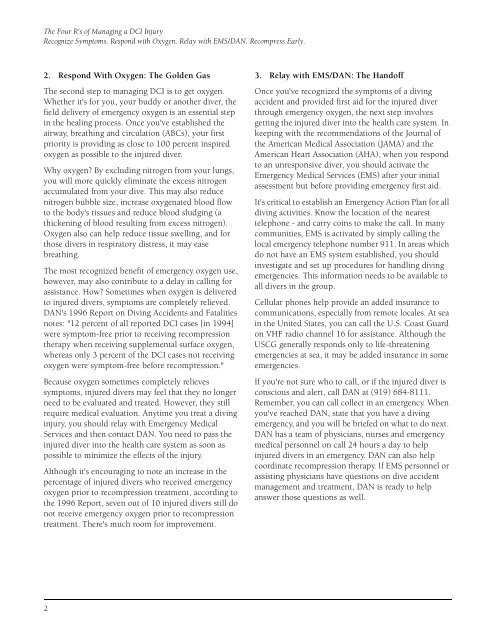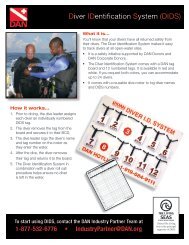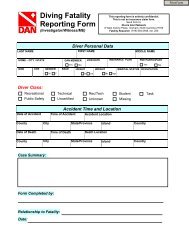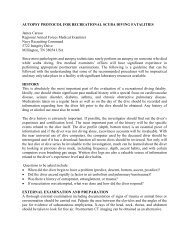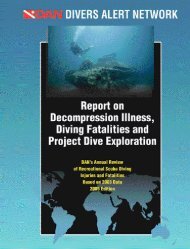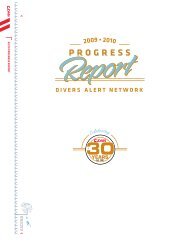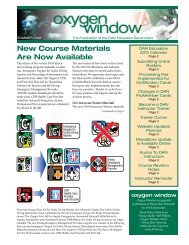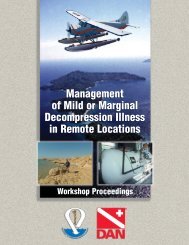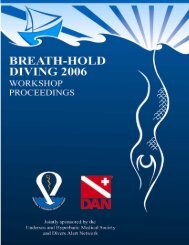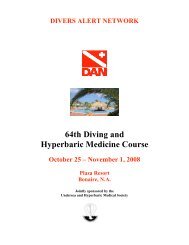The Four R's Of Managing A DCI Injury - Divers Alert Network
The Four R's Of Managing A DCI Injury - Divers Alert Network
The Four R's Of Managing A DCI Injury - Divers Alert Network
You also want an ePaper? Increase the reach of your titles
YUMPU automatically turns print PDFs into web optimized ePapers that Google loves.
<strong>The</strong> <strong>Four</strong> <strong>R's</strong> of <strong>Managing</strong> a <strong>DCI</strong> <strong>Injury</strong><br />
Recognize Symptoms. Respond with Oxygen. Relay with EMS/DAN. Recompress Early.<br />
2. Respond With Oxygen: <strong>The</strong> Golden Gas<br />
<strong>The</strong> second step to managing <strong>DCI</strong> is to get oxygen.<br />
Whether it's for you, your buddy or another diver, the<br />
field delivery of emergency oxygen is an essential step<br />
in the healing process. Once you've established the<br />
airway, breathing and circulation (ABCs), your first<br />
priority is providing as close to 100 percent inspired<br />
oxygen as possible to the injured diver.<br />
Why oxygen? By excluding nitrogen from your lungs,<br />
you will more quickly eliminate the excess nitrogen<br />
accumulated from your dive. This may also reduce<br />
nitrogen bubble size, increase oxygenated blood flow<br />
to the body's tissues and reduce blood sludging (a<br />
thickening of blood resulting from excess nitrogen).<br />
Oxygen also can help reduce tissue swelling, and for<br />
those divers in respiratory distress, it may ease<br />
breathing.<br />
<strong>The</strong> most recognized benefit of emergency oxygen use,<br />
however, may also contribute to a delay in calling for<br />
assistance. How? Sometimes when oxygen is delivered<br />
to injured divers, symptoms are completely relieved.<br />
DAN's 1996 Report on Diving Accidents and Fatalities<br />
notes: "12 percent of all reported <strong>DCI</strong> cases [in 1994]<br />
were symptom-free prior to receiving recompression<br />
therapy when receiving supplemental surface oxygen,<br />
whereas only 3 percent of the <strong>DCI</strong> cases not receiving<br />
oxygen were symptom-free before recompression."<br />
Because oxygen sometimes completely relieves<br />
symptoms, injured divers may feel that they no longer<br />
need to be evaluated and treated. However, they still<br />
require medical evaluation. Anytime you treat a diving<br />
injury, you should relay with Emergency Medical<br />
Services and then contact DAN. You need to pass the<br />
injured diver into the health care system as soon as<br />
possible to minimize the effects of the injury.<br />
Although it's encouraging to note an increase in the<br />
percentage of injured divers who received emergency<br />
oxygen prior to recompression treatment, according to<br />
the 1996 Report, seven out of 10 injured divers still do<br />
not receive emergency oxygen prior to recompression<br />
treatment. <strong>The</strong>re's much room for improvement.<br />
3. Relay with EMS/DAN: <strong>The</strong> Handoff<br />
Once you've recognized the symptoms of a diving<br />
accident and provided first aid for the injured diver<br />
through emergency oxygen, the next step involves<br />
getting the injured diver into the health care system. In<br />
keeping with the recommendations of the Journal of<br />
the American Medical Association (JAMA) and the<br />
American Heart Association (AHA), when you respond<br />
to an unresponsive diver, you should activate the<br />
Emergency Medical Services (EMS) after your initial<br />
assessment but before providing emergency first aid.<br />
It's critical to establish an Emergency Action Plan for all<br />
diving activities. Know the location of the nearest<br />
telephone - and carry coins to make the call. In many<br />
communities, EMS is activated by simply calling the<br />
local emergency telephone number 911. In areas which<br />
do not have an EMS system established, you should<br />
investigate and set up procedures for handling diving<br />
emergencies. This information needs to be available to<br />
all divers in the group.<br />
Cellular phones help provide an added insurance to<br />
communications, especially from remote locales. At sea<br />
in the United States, you can call the U.S. Coast Guard<br />
on VHF radio channel 16 for assistance. Although the<br />
USCG generally responds only to life-threatening<br />
emergencies at sea, it may be added insurance in some<br />
emergencies.<br />
If you're not sure who to call, or if the injured diver is<br />
conscious and alert, call DAN at (919) 684-8111.<br />
Remember, you can call collect in an emergency. When<br />
you've reached DAN, state that you have a diving<br />
emergency, and you will be briefed on what to do next.<br />
DAN has a team of physicians, nurses and emergency<br />
medical personnel on call 24 hours a day to help<br />
injured divers in an emergency. DAN can also help<br />
coordinate recompression therapy. If EMS personnel or<br />
assisting physicians have questions on dive accident<br />
management and treatment, DAN is ready to help<br />
answer those questions as well.<br />
2


